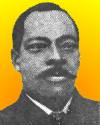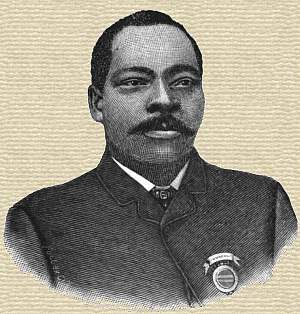 (source)
(source)
|
Granville T. Woods
(23 Apr 1856 - 30 Jan 1910)
American inventor who has been called "the Black Edison" on account holding the most patents by an African-American in his era.
|
Granville T. Woods, Esq.
Electrician—Mechanical-Engineer—Manufacturer of Telephone, Telegraph and Electrical Instruments.
from Men of Mark (1887)
[p.107] “SOME men are born great; some have greatness thrust upon them; and some achieve greatness.” To the last class belongs G. T. Woods, who was born in Columbus, Ohio, April 23, 1856. He attended school until he was ten years of age, when he was placed in a machine shop where he learned the machinist and blacksmith trades. In the meantime he took private lessons and attended night school, and exhibited great pluck and perseverance in fitting himself for the work he desired to undertake. He pursued with assiduity every study which promoted that end. November, 1872, he left for the West, where he obtained work as a fireman and afterwards as an engineer on one of the Iron Mountain Railroads of Missouri. While in the employ of the railroad company he had a great deal of leisure, and as saloons had no attractions for him, he took up the study of electricity as a pastime. In December, 1874, he went to Springfield, Illinois, where he was employed in a rolling-mill. Early in 1876 he left for the East, where he received two years special training in electrical and mechanical [p.108] engineering at college. While obtaining his special instructions, he worked six half days in each week in a machine shop, the afternoon and evening of each day being spent in school. February 6, 1878, he went to sea in the capacity of engineer on board the Ironsides, a British steamer. While a sailor, he visited nearly every country on the globe. During 1880 he handled a locomotive on the D. & S. Railroad. Since then he has spent the major portion of his time in Cincinnati, Ohio, where he has established a factory for the purpose of carrying on the business, as indicated at the head of this sketch. A company has been formed recently for the purpose of placing Mr. Woods’ Electrical Railway Telegraph on the market. Mr. Woods says that he has been frequently refused work because of the previous condition of his race, but he has had great determination and will and never despaired because of disappointments. He always carried his point by persistent efforts. He says the day is past when the colored boys will be refused work only because of race prejudice. There are other causes. First, the boy has not the nerve to apply for work after being refused at two or three places. Second, the boy should have some knowledge of mechanics. The latter could be gained at technical schools, which should be founded for the purpose. In this respect he shows good sense and really prophesies the future of the race, and these schools must sooner or later be established, and thereby we shall be enabled to put into the hands of our boys and girls the actual means for a livelihood. He is the inventor of the “Induction Telegraph,” a system for communicating to and from moving trains, and is intended [p.109] to diminish the loss of life and property, and produce a maximum of safety to travelers. In the United States patent office, in the case of Woods vs. Phelps’ Railway Telegraph Interference—L. M. Hosea, attorney for Woods, and W. D. Baldwin, attorney for Phelps—it will be shown that the patent office has decided that Mr. Woods was the prior inventor of this system. His rights having been questioned, he secures this verdict which gives him triumphal possession of a great discovery. The following is taken from the Scientific American:
The public prints give us almost daily accounts of railway collisions in one section of the country or another. Every effort has been made to avert these. The general introduction of the telegraph has unquestionably done much in this direction; but in thick weather the operatives at the railway stations could scarcely be looked to to guard points of the road beyond their ken, and the railway switchman or signalman, as in other walks of life, is fallible. If railway signalmen could be found who require neither sleep nor rest, who are not subject to fits or spasms or spirituous excesses,, and, above all, having eyes to pierce the fog, then railroad travel would indeed be divested of its greatest terrors. But, taking human nature as we find it, we learn that so grave a responsibility as the care of human life should never be thrust upon the shoulders of a single man.
The “Block System” recently introduced would, it was believed, prove a reliable means of preventing accidents on the rail, and it is but fair to say that it has made an excellent record; but that it is not, under all conditions and circumstances, to be relied upon, there is abundant evidence. Only last week it failed to prevent a collision between two freight trains at New Brunswick, New Jersey, on the line of the Pennsylvania railroad, in which two lives were lost and property to the value of half a million dollars destroyed. It was of course only by mere chance that these trains were not carrying passengers. From this it may be inferred how pressing is the demand for some system in which the safety of the traveling public is not made to rely on an unthinking and not [p.110] always reliable automaton, or, still worse, upon the action of an overworked and irresponsible employee, whose perception of colors may be defective.
Many able electricians have believed the solution of this problem to lie within the domains of the electrical science; and those who have followed the drift of recent electrical endeavors are aware of the contrivances, all looking towards the same goal, that have made their appearance. The general principle on which all these have been based was electrical communications between all trains, while en route, and the train despatcher; most of these systems have shown a certain degree of efficiency when tested under favorable conditions, but the best of them were subject to interruptions, and this, from the very nature of the work they were called upon to perform, has been rendered more or less uncertain, owing to the fact that they relied upon a direct contact with the conductor, either by a wire, wheel or brush.
Now comes forward a practical system of train signaling, which does not rely upon contact at all; the electrical induction coil upon the moving train being distant from the conductor, lying between the track at least seven inches.
The future possibilities of these new inventions appear to be very great; just how far the system can be extended and applied it is impossible to foretell. But this appears to be certain; the risk of disaster on railways will be greatly reduced from this time onward.
Mr. Woods claims that his invention is for the purpose of averting accidents by keeping each train informed of the whereabouts of the one immediately ahead or following it; in intercepting criminals; in communicating with stations from moving trains; and in promoting general, social and commercial intercourse. The following appeared in the Cincinnati Sun:
Granville T. Woods, a young colored man of this city, has invented a new system of electrical motor, for street railroads. He has invented also a number of other electrical appliances, and the syndicate controlling his inventions think they have found Edison’s successor.
[p.111] The Cincinnati Colored Citizen, in its issue of January 29, 1887, says:
We take great pleasure in congratulating Mr. G. T. Woods on his success in becoming so prominent that his skill and knowledge of his chosen art compare with that of any one of our best known electricians of the day.
The Catholic Tribune, January 14, 1886, said of him:
Granville T. Woods, the greatest colored inventor in the history of the race, and equal, if not superior, to any inventor in the country, is destined to revolutionize the mode of street car transit. The results of his experiments are no longer a question of doubt. He has excelled in every possible way in all his inventions. He is master of the situation, and his name will be handed down to coming generations as one of the greatest inventors of his time. He has not only elevated himself to the highest position among inventors, but he has shown beyond doubt the possibility of a colored man inventing as well as one of any other race.
The following appeared in the American Catholic Tribune, April 1, 1887 (Cincinnati, Ohio):
Mr. Woods, who is the greatest electrician in the world, still continues to add to his long list of electrical inventions.
The latest device he invented is the Synchronous Multiplex Railway Telegraph. By means of this system, the railway despatcher can note the position of any train on the route at a glance. The system also provides means for telegraphing to and from the train while in motion. The same lines may also be used for local message without interference with the regular train signals.
This system may be used for other purposes. In fact, two hundred operators may use a single wire at the same time. Although the messages may be passing in opposite directions, they will not conflict with each other.
In using the devices there is no possibility of collisions between trains, as each train can always be informed of the position of the other while in motion. Mr. Woods has all the patent office drawings for these devices, as your correspondent witnessed.
[p.112] The patent office has twice declared Mr. Woods prior inventor of the induction railway telegraph as against Mr. Edison, who claims to be the prior inventor. The Edison & Phelps company are now negotiating a consolidation with the Wood’s Railway Telegraph company.
It is recorded that a very distinguished preacher said: “If everything the Negro had invented was sunk at the bottom of the sea, the world would not miss them, and would move on as before.” This was not true then, is not true now, and will be less so in the future. Hundreds of slaves invented instruments which have been taken by their masters and patented, and many others for want of means to put their inventions through the patent office and manufacture them, have sold their knowledge for almost a “mess of pottage.” The future will bring forth men who will yet astonish the world with inventions of labor-saving character, and add materially to the wealth of the nation, by producing those instruments which will decrease manual labor, multiply articles more rapidly, facilitate communication and benefit mankind.
- Science Quotes by Granville T. Woods.
- 23 Apr - short biography, births, deaths and events on date of Woods's birth.
- Black Inventors in the Age of Segregation, by Rayvon Fouche. - book suggestion.
- Booklist for Black Inventors.





